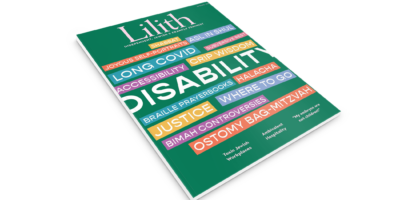
A Tragicomic Tale of Sisters
A few months after her younger sister, Poppy, comes to crash in her Brooklyn apartment, 28-year-old Jules Gold ruminates, “I wish I could claw her face off, get to her soul, understand who she is, feel safe in thinking I know her.” This search for genuine human connection—however impossible it may be in our modern, screen-obsessed world—is at the heart of Worry, a darkly funny debut novel by Alexandra Tanner (Scribner, $27.00). Worry follows Jules and Poppy as they navigate life’s absurdities in 2019, a year of peak anxiety for the two sisters—and for America at large.
Poppy arrives in Brooklyn, a year and a half out from a suicide attempt. Plagued by chronic depression and hives, she seeks a fresh start—and a refuge from their narcissistic mother, Wendy. Meanwhile Jules, newly single and living in a poorly maintained building that was once a Jewish hospital, feels stuck in every domain of her life. She has dreamed of “trying to write a novel, like everyone else,” but now she spends her days editing study guides for a SparkNotes knockoff called BookSmarts and feeding a growing inter- net addiction. She has an ever-expanding collection of Mormon mommy bloggers whom she follows obsessively on Instagram, “each compressing their lives into posts, posts, posts: uncountable shining garnets of the sickest, most deranged content imaginable.” Despite her disgust, Jules can’t look away from her “mommies,” who argue that the world is flat, rage against the Deep State, and traffic in antisemitic conspiracies.
Worse still, she can’t decide how she feels about Poppy’s presence. In her tender moments, she encourages Poppy to stay permanently and even orders her a bed. “Sometimes all it takes for me to feel happy,” she thinks on her commute home, “is to realize that Poppy, on the other side of the bridge, is happy herself.” At other moments, she’s unkind and resentful, blaming Poppy for reflecting her own fail- ings and insecurities back to her: “Having a sister is looking in a cheap mirror: what’s there is you, but unfamiliar and ugly for it.”
The sisters alternately come together and drift apart. They find new, yet unfulfilling jobs: Jules writing for an astrology app, and Poppy working in a private school’s guidance office and then assuming Jules’s former duties at BookSmarts. They compete for their mother’s affection. They adopt an ornery, three-legged rescue dog named Amy Klobuchar. Poppy’s hives return, and Jules suffers uterine polyps and a possible eating disorder.
As these characters stumble and doom-scroll through the year, Tanner creates a portrait of contemporary life that is equal parts hilarious, brutal, and affecting. I found myself laughing and nodding at Jules’s observations about “adulting” in New York—from her disastrous dates with men she meets on “the apps” to her office malaise: “My most constant happiness comes from the few minutes each day when I can sneak away from my desk, make a shitty K-cup coffee, and briefly sit alone on our WeWork knock-off ’s terrace while I drink it.” Jules is honest and often biting about her discontent, her jealousy at artists who have made it, and her awareness that she will never join their ranks. Even when she attempts to turn her internet obsession into a writing project, she knows it is only “an excuse to feel like the way … [she] wasted her time was special.”
Yet, beneath Jules’s witty and caustic musings, Tanner conveys a deep loneliness and quest for connection that the internet can’t provide. Jules acknowledges she has no friends, while Poppy maintains superficial connections to a handful of college classmates. Their mother, a Messianic Jew who gradually adopts the warped worldview of the “mommies,” considers her daughters a disappointment. And their dermatologist father offers only the occasional text (“Go to temple. Find a good rabbi.”) and a complimentary facial “zhuzh” whenever Jules visits her parents in South Florida.
Unable to find it elsewhere, the sisters seek love and acceptance in one another. Near the novel’s end, after a catastrophic trip home, Poppy questions why she needs her mother’s approval. “Because all anyone wants is to be mothered. Taken care of,” Jules consoles. “It’s what I learned about you, and it’s what I learned about me.”
Their short-lived truce made me want to put down my phone and talk to someone I love, if only for a fleeting moment.
Kate Schmier is a writer and editor in New York City.




